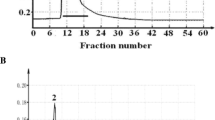Physicochemical properties of hyaline cartilage homogenates were studied by the method of microcalorimetry. Collagen hydrolysates were obtained after homogenization of hyaline cartilages under high pressure conditions at the temperatures that denaturate collagen. Thermodynamic parameters of thermal transition of collagen in cartilage suspension were determined. Enthalpy of thermal transition ΔН decreases in comparison with the control. Thermal transition half-width ΔТ varies with temperature. More denatured and homogeneous samples were obtained at homogenization temperature 80°C. According to spectral studies, particles in the samples obtained at the temperature of 80°C were smaller. The temperature of 80°C is preferred for homogenizing hyaline cartilages and obtaining collagen type II short peptides.
Similar content being viewed by others
References
Ignat’eva NY, Averkiev SV, Lunin VV, Sobol EN. Denaturation of collagen II in a cartilaginous tissue during its thermal and laser heating. Russ. J. Phys. Chem. A. 2005;79(8):1333-1340.
Laser Engineering of the Cartilage. Bagratishvili VN, Sobol EN, Shekhter AB, eds. Moscow, 2006. Russian.
Logunova MA, Andreeva IV, Ingatieva NYu, Shakhova MA, Bagratiashvili VN, Kamenskii VA. Decreased collagen thermal stability as a response to the loss of structural integrity of thyroid cartilage. Biophysics. 2008;53(5):470-475.
Nikolaeva TI, Kuznetsova SM, Rogachevsky VV. Collagen fibril formation in vitro at nearly physiological temperatures. Biophysics. 2012;57(6):757-763.
Nikolaeva TI, Laurinavichus KS, Kaptsov VV, Molchanov MV, Shekhovtsov PV. Development of Low-Molecular Weight Collagen Peptide Complex with Glycosaminoglycan Components. Bull. Exp. Biol. Med. 2018;165(5):629-634. doi: https://doi.org/10.1007/s10517-018-4229-0
Nikolaeva TI, Laurinavicius KS, Kaptsov VV, Chernyi RA, Shekhovtsov PV. Collagen Peptides from Hyaline Cartilage for the Treatment and Prevention of Joint Diseases: Isolation and Characteristics. Bull. Exp. Biol. Med. 2019;167(2):242-246.doi: https://doi.org/10.1007/s10517-019-04500-5
Nikolaeva TI, Molchanov MV, Laurinavichus KS, Kaptsov VV, Shehovtsov PV. Study of enzymatic hydrolysis of collagen proteins of cartilage tissue. Mezhdunarod. Zh. Priklad. Fundament. Issled. 2016;(10-3):442-447. Russian.
Nikolaeva TI, Polozov RV, Rochev YuA, Tiktopulo EI. Thermodynamic and structural characteristics of collagen fibrils formed in vitro at different temperatures and concentrations. Biophysics. 2007;52(2):191-195.
Kaptsov VV, Rusakov GN, Illarionov JuA, Solov’ev VE, Kukushkin NI, Fajn AM. Patent RU No. 2035855. Laboratory homogenizer. Bull. No. 15. Published May 27, 1995. Russian.
Potekhin SA. High pressure scanning microcalorimetry is new method for studying conformational and phase transitions. Uspekhi Biol. Khimii. 2018;58:285-312. Russian.
Telishevskaya LYa. Protein Hydrolysate: Obtaining, Composition, Application. Panin AN, ed. Moscow, 2000. Russian.
Tutel’yan VA, Khavinson VK, Malinin VV. Physiological Role of Short Peptides in Nutrition. Bull. Exp. Biol. Med. 2003;135(1):1-5.
Edsall JT, Gutfreund H. Biothermodynamics. Moscow, 1986. Russian.
Selvakumar P, Ling TC, Covington AD, Lyddiatt A. Enzymatic hydrolysis of bovine hide and recovery of collagen hydrolysate in aqueous two-phase systems. Sep. Purif. Technol. 2012;89:282-287. doi: https://doi.org/10.1016/j.seppur.2012.01.046
Van Vijven JP, Luijsterburg PA, Verhagen AP, van Osch GJ, Kloppenburg M, Bierma-Zeinstra SM. Symptomatic and chondroprotective treatment with collagen derivatives in osteoarthritis: a systematic review. Osteoarthritis Cartilage. 2012;20(8):809-821. doi: https://doi.org/10.1016/j.joca.2012.04.008
Author information
Authors and Affiliations
Corresponding author
Additional information
Translated from Byulleten’ Eksperimental’noi Biologii i Meditsiny, Vol. 171, No. 1, pp. 38-42, January, 2021
Rights and permissions
About this article
Cite this article
Nikolaeva, T.I., Kuznetsova, S.M., Emelyanenko, V.I. et al. Preparation of Type II Collagen Short Peptides: Temperature Conditions of Cartilage Homogenization and Collagen Hydrolysis. Bull Exp Biol Med 171, 28–31 (2021). https://doi.org/10.1007/s10517-021-05165-9
Received:
Published:
Issue Date:
DOI: https://doi.org/10.1007/s10517-021-05165-9



